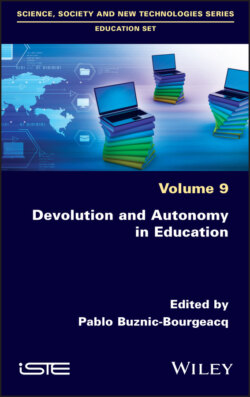Читать книгу Devolution and Autonomy in Education - Группа авторов - Страница 13
Open conclusion on the processes of devolution and institutionalization
ОглавлениеWondering about the devolution process thus leads to questioning the institutionalization process. These processes, when understood as a movement between institutional knowledge and situational knowledge (devolution: from institutional knowledge to situational knowledge; institutionalization: from situational knowledge to institutional knowledge) appear to be interdependent. The teacher, at the moment when he or she conceives a project of teaching, is led to install situations that summon situational knowledge (process of devolution); this situational knowledge, which is invested by the student, will be progressively transformed (formulated, validated, formalized, memorized, etc.) into knowledge in the institution of the class and finally be brought together with knowledge from other institutions (process of institutionalization).
This description might suggest that these are processes that flow smoothly, but this is generally not the case:
– The situations put in place more or less deliberately by the teacher and invested by students may not call upon a situational knowledge that is appropriate to the knowledge to be taught, in which case it causes a rupture for these students, in their expectation of legitimization of the situational knowledge they have invested during the situation.
– The situational knowledge used by students in situations, especially when they do not correspond to what the teacher has anticipated, may be ignored by the teacher who may believe that the student is not engaging any situational awareness (that he or she is inattentive, that he or she has not understood the instruction, etc.).
If these phenomena occurred only rarely and if they almost never involved the same students, it would have little effect. However, there seems to be a recurrence of phenomena that I have called “didactic bifurcations” (Margolinas 2005), which often involve students participating in the devolution process by investing in unforeseen situations (Margolinas and Thomazet 2004; Margolinas and Laparra 2008).
This observation leads us to reconsider knowledge. Indeed, there are many institutions and they all produce knowledge, but some is not recognized as such, in particular knowledge that strongly engages bodies in the co-presence of other bodies: the knowledge of orality (Laparra and Margolinas 2016). The didactic transposition (Chevallard 1985) studies and describes the transformations necessary for this knowledge to be considered, in another institution (the school institution), as knowledge to be taught, which is historically and socially constituted as “school disciplines”. The didactics of the disciplines were historically constituted with reference to the disciplines of secondary education, which was undoubtedly an initial necessity in order to affirm the specific character of the study of the transmission of each field of knowledge. However, knowledge, which is at the heart of the didactics of each “discipline”, is thus defined externally to the didactics, which is not a satisfactory solution at the epistemological level.
Concretely, by working for 15 years with a French language tutor (Marceline Laparra, CREM, University of Metz), several phenomena have come to light that lead to questioning of these disciplinary boundaries. In particular, we have shown (Margolinas 2010; Laparra and Margolinas 2016) that the enumeration, pointed out by Brousseau (1984) and characterized by Briand (1999), provides leads for the analysis of recurrent difficulties of students in a large number of school situations, particularly in French language classes. The fact that enumeration appears only marginally in official texts (in France, only once, in the 2015 Cycle 1 curriculum, in relation to numbers) and that it is associated only with counting, prevents teachers from conceiving a link between the differences they observe in student procedures for “organizing” their actions and the knowledge to be acquired. In order for the dual process of devolution and institutionalization to proceed satisfactorily, it is still necessary for institutional knowledge and situational knowledge to be identified, which is not always the case, and which has led us to speak of “transparent knowledge” (Margolinas and Laparra 2008) for knowledge that exists in an institution but that is not, at a given moment in the history of the school institution, visible to it.
In this foreword, I have shown, on the one hand, that devolution is not a phase but a process (Margolinas 1993), and, on the other hand, that this process is linked to the process of institutionalization. These processes, even if they have been the subject of studies since they were first highlighted in the early 1980s, are not yet sufficiently well known, and moreover, their study requires a reconsideration of knowledge. This book, opening up this consideration to various scientific fields and disciplines is therefore very relevant and topical.
Claire MARGOLINAS
ACTé Laboratory
Clermont Auvergne University
April 2021
